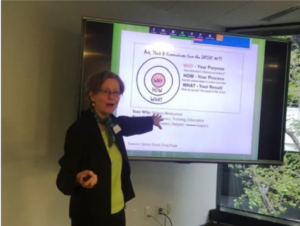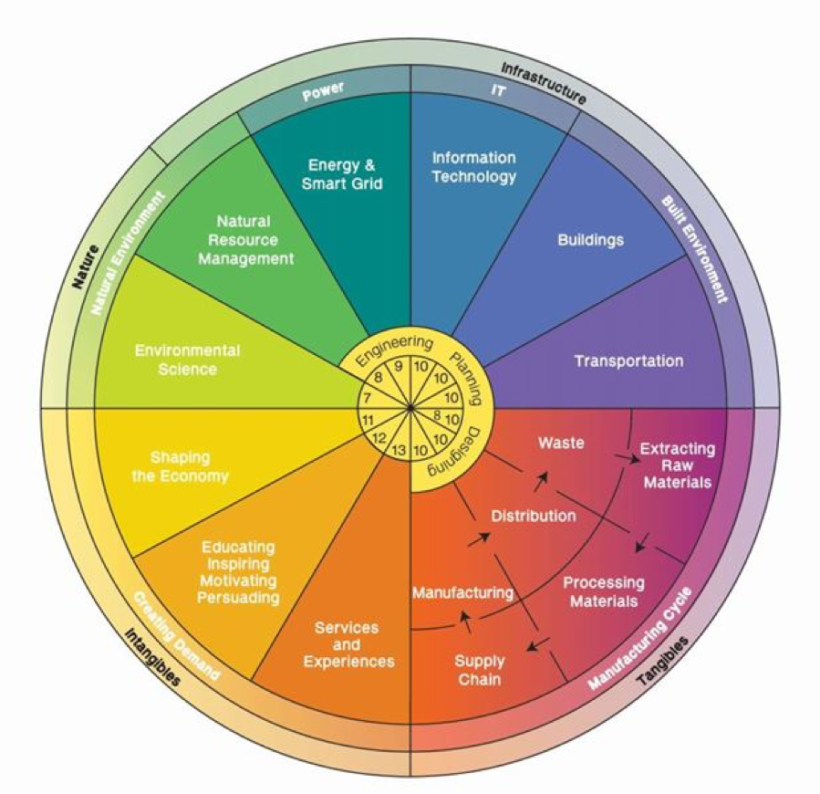 By APARAJITA BANERJEE
By APARAJITA BANERJEE
Highlights from Green Career Momentum #1, May 10, 2018
Leaders in Energy (LE) conducted a 5-session Green Career Momentum (GCM) program from May 10th – June 14th, 2018. This career development program and job network was developed by LE to help people to land or create their dream job in the green economy. Speakers were featured who represented different sectors of the green economy along with exercises to help participants gain skills in landing or creating a green job. The sessions aligned with four key quadrants of the Green Economy (see figure above).
On May 10th, the topic was “The Green Economy: Job and Career Trends You Need to Know About.” The speaker was Norman Christopher, Executive Director, Office of Sustainability Practices, Grand Valley State University and the author of the book Sustainability Demystified! was the speaker. The skill was “Identifying Energy Sustainability Jobs in the new Economy.” The Green Economy focus area was clean energy, energy efficiency, and the electric grid.

Norman Christopher, Executive Director, Office of Sustainability Practices, Grand Valley State University
Our instructor was Dr. Beth Offenbacker, Principle, Waterford Inc, and Director for Training and Development, Leaders in Energy.
Changes Leading to New Opportunities
Christopher began the presentation by pointing out that as we are changing how we produce and consume energy that the nature of the economy is also evolving. The business models that are followed in the new economy are changing from following a command and control approach to one that is more empowering through collaborations. As a result, demand for new types of skill sets is emerging that may not be learned within the boundaries of traditional disciplines and may be acquired in multi-skilled learning environments.
As much of the future of the new economy is unknown, the definition of success has shifted from short-term outcomes to long-term value creation. Therefore, not only are technologies becoming cleaner that operate under the assumption that resources are finite, but organizational cultures are also changing to make a new set of norms where leadership is bottom-up, decision making is group-oriented, motivations are intrinsic, and core values are based on truth, honesty, and innovation.
Obtaining Skills for the New Economy and Green Jobs
With the changes in technologies and means and ways of energy production, different jobs are being created that require skills from job seekers including data management, environmental impact assessment, sustainability assessment, sustainability and compliance reporting, expertise in climate change mitigation, conservation, and Green/LEED building and construction. Jobseekers with soft skills like creative problem solving, communications, computer and technical literacy, relationship management, strong work values, leadership, interpersonal relationship development, and research are in higher demand. New jobs are increasing in sectors like energy efficiency and conservation, alternative energy sources, alternative fuels, energy support and service, energy storage, and power distribution.
Obtaining credentials through certifications can be an important way to gain additional skills and tailor one’s interest to the jobs in the green arena. There are a number of certification programs including focused on: Green Chemistry • Design for the Environment (DfE) • Environmental Engineering • Green & LEED Building Design & Construction • Sustainability Assessment, Planning & Reporting • Sustainability Standards & Certifications • Sustainability Risk Assessment • Life Cycle Analysis (LCA) • Energy and Water Management Efficiencies • Resiliency and Climate Mitigation • Social Responsibility & Citizenship • Environmental Management Systems • Sustainable Agriculture and Urban Farming
Increasing Importance of Networking for Job Seekers for New Jobs in the New Economy
There is also a shift in how entry-level job seekers are getting jobs in the new economy. More people are getting jobs through networking and becoming members of trade and professional organizations, doing projects with organizations, using social media platforms and websites, and starting with smaller sustainable energy entities where several skills can be learned by wearing different hats. Therefore, entry-level jobs come in different designations, including analyst, coordinator, associate, engineer, intern, planner, supervisor, environmental educator, or green project architect.
Among the various points that Christopher made in his presentation, the main takeaway lesson was that as the economy evolves, traditional ways of acquiring skills and getting jobs are being challenged and dynamic job seekers agreeable to adapting to changes can have a highly successful career in the new economy.
Skill Exercise on Identifying One’s Strengths through a Brain Assessment Tool
Dr. Beth Offenbacker provided an assessment in advance of the session to help the participants to identify their top brain talents. Example of categories included − Vision, Resilience, Critical Thinking, Commitment, Proactivity, among others. A group exercise was conducted by breaking into small group sessions to discuss how individual strengths could be combined via small teams for more effective team work and problem-solving.

Dr. Beth Offenbacker, Green Career Momentum Instructor
Leaders in Energy will be conducting its 5thannual Green Jobs Forum on August 16th, 2018. See more details here.
Aparajita Banerjee, Ph.D. in Environmental and Energy Policy, is interested in exploring how effective policies can be framed and implemented to transition to a sustainable and alternative future. Her expertise are in bioenergy and renewable energy, sharing and circular economy, and degrowth. Apart from publishing in different peer-reviewed journals, she has recently co-edited a book titled “Environmental Policy and the Pursuit of Sustainability.”



Leave a Reply